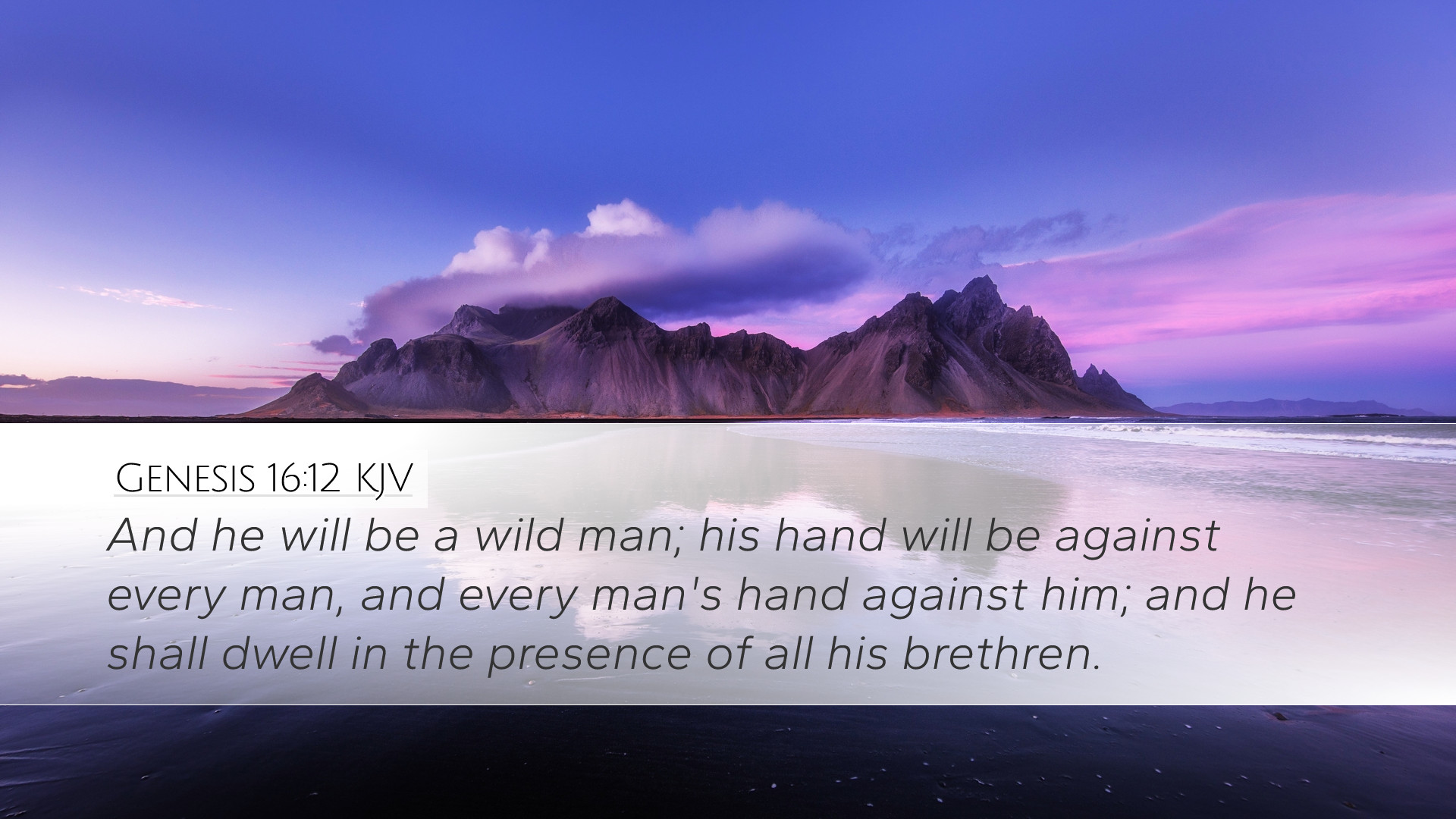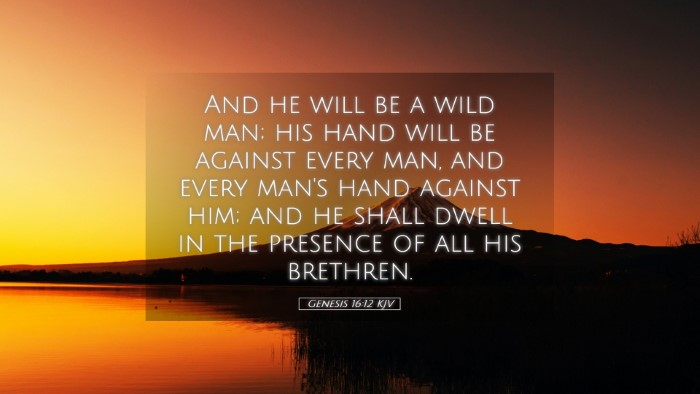Commentary on Genesis 16:12
Genesis 16:12 states, "And he will be a wild man; his hand will be against every man, and every man’s hand against him; and he shall dwell in the presence of all his brethren." This verse refers to Ishmael, the son of Hagar, and contains profound implications for understanding his character and legacy.
Contextual Background
This passage occurs within the narrative of Abram, Sarai, and Hagar. In their impatience to fulfill God's promise of offspring, Sarai offers her maid, Hagar, to Abram to bear a child. This act leads to tensions that set the stage for God's eventual instruction about Hagar’s son. Understanding the immediacy of this situation is crucial for interpreting the prophecy concerning Ishmael.
Insights from Public Domain Commentaries
Matthew Henry's Commentary
Matthew Henry emphasizes that the description of Ishmael as a “wild man” signifies a character marked by freedom, independence, and a rugged nature. Henry translates this into an implication of conflict, suggesting that Ishmael would lead a life characterized by strife and enmity with others. The phrase "his hand will be against every man," indicates that Ishmael was destined for a life of opposition, both with his kin and beyond. Henry notes the historical and prophetic implications of this verse, pointing out the longstanding conflicts arising from Ishmael’s lineage.
Albert Barnes' Notes on the Bible
Albert Barnes offers a more specific interpretation, suggesting that “wild man” can be understood as indicating a "wild ass of a man," implying both strength and untamed ferocity. Barnes acknowledges that Ishmael's descendants historically manifest a spirit of independence. He elaborates on the phrase "he shall dwell in the presence of all his brethren,” interpreting it as a foreshadowing of the tension between Isaac's descendants and those of Ishmael, yet indicates a coexistence that would lead to ongoing conflict. Barnes remarks on the sociopolitical dynamics that emerge from this familial separation, underscoring how the biblical narrative encapsulates broader historical realities.
Adam Clarke's Commentary
Adam Clarke provides a unique analysis of the implications of Ishmael’s description. He connects the characterization of Ishmael with the future of nations, noting that "his hand will be against every man" serves as a prophetic insight into the nature of his descendants. Clarke proposes that this life of conflict stems from Ishmael’s origins, drawing parallels with contemporary tribes as having similar traits. Highlighting the significance of the wilderness, Clarke interprets Ishmael's destiny as one of survival in harsh environments, emblematic of the socio-economic struggles faced by nomadic peoples.
Theological Implications
The theological implications of Genesis 16:12 extend beyond the life of Ishmael. This verse sets the stage for understanding the complexities of divine promise and human action:
- Human Initiative vs. Divine Plan: The tension between Sarai’s initiative to help God fulfill His promise and God’s plan demonstrates the complications inherent in human attempts to assist divine intentions.
- Nature of Conflict: The characterization of Ishmael speaks to the nature of conflict in the world, symbolizing broader themes of strife among nations arising from familial disputes.
- Grace and Redemption: Despite the difficulty in Ishmael’s prophetic nature, God still provides for him and Hagar, highlighting God's grace and provision even in complicated situations.
- Cultural and Ethnic Relations: This passage invites reflection on modern cultural and ethnic conflicts, encouraging readers to find understanding amidst discord based on shared ancestry and divine purpose.
Application for Ministers and Theologians
For pastors and theologians, Genesis 16:12 serves as a reminder of the need for patience and faith in God’s promises. It brings to the forefront the consequences of actions taken in haste, encouraging a theological reflection on the implications of human decisions on subsequent generations. Furthermore, the ongoing narrative of conflict within the biblical text should inspire dialogue about peace and reconciliation in modern contexts.
Conclusion
Genesis 16:12 encapsulates essential themes of conflict, heritage, and the complexity of divine fulfillment. As Ishmael is portrayed as a figure marked by struggle, it reminds us of the intricacies in the journey of faith and the unfolding of God’s plans through human history. By reflecting on the insights from various commentaries, one can glean a deeper understanding of the implications of this verse for our lives and ministries today.


